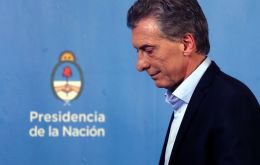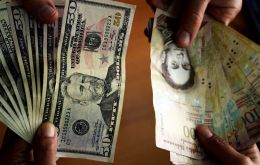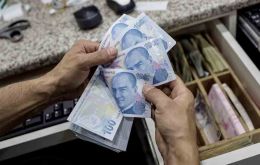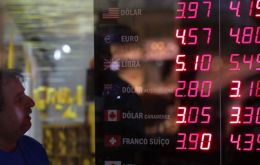MercoPress. South Atlantic News Agency
Tag: dollar
-
Tuesday, June 3rd 2025 - 10:38 UTC
Chavista regime cracks down on black market dollar handlers

Venezuelan authorities arrested 15 men and 10 women for their alleged involvement in manipulating the black market dollar, impacting the economy. The suspects, including operators, managers, liquidity providers, developers, programmers, and payment receivers, handled 18 websites setting parallel dollar prices, causing economic distortions. Some of these portals illegally captured funds without banking authorization, it was explained.
-
Thursday, July 14th 2022 - 09:10 UTC
Ukraine war: Euro cheaper than the US dollar for the first time in two decades

As Ukraine war continues and fears that Russia could further restrict Europe's supplies of gas, increasing the chances of a recession in the Eurozone, the European common currency has fallen below the dollar for the first time in nearly 20 years.
-
Friday, January 31st 2020 - 08:25 UTC
Coronavirus and current account deficit hit the Brazilian Real against the dollar

Brazil’s currency the Real hit a two-month low against the dollar on Thursday, slumping to within sight of its record low under a wave of global risk aversion on fears over the coronavirus outbreak and its diminishing yield appeal.
-
Tuesday, November 19th 2019 - 08:55 UTC
Maduro publicly thanks God for the all mighty dollar as an escape valve for Venezuela's economy

Venezuelan President Nicolás Maduro embraced the currency of his bitter rival the United States on Sunday, calling it an “escape valve” that can help the country weather its economic crisis amid U.S. sanctions aimed at forcing him from power.
-
Saturday, May 4th 2019 - 09:56 UTC
Brazil and Argentine currencies recover against a weaker US dollar

Latin American currencies ended on a high note on Friday against a weaker dollar after robust U.S. jobs data painted a brighter picture for global growth and gave the U.S. central bank more reason to stay on its dovish path.
-
Thursday, April 25th 2019 - 21:48 UTC
Economic collapse in Argentina worsens in a volatile day: Macri blames uncertainty

Argentina lived on Thursday another day in which the dollar rebounded and the country risk exceeded 1000 points. President Mauricio Macri criticized the “short-term” view of the markets and the Central Bank (BCRA) had to intervene by positioning the interest rate at 70% and diverting the futures market to contain the demand on the currency, preventing it from reaching the maximum accorded of 51.45 pesos.
-
Wednesday, January 30th 2019 - 08:48 UTC
Emerging markets vulnerable to US higher rates and stronger dollar

Emerging markets face more downgrades than upgrades this year as foreign debt levels leave them vulnerable to rising U.S. interest rates and the strength of the dollar, according to Fitch Ratings. Latin America, the Middle East and Africa will be impacted more by lower credit scores because of the high share of their foreign-currency debt, said James McCormack, Hong Kong-based global head of the sovereign and supranational group at Fitch.
-
Tuesday, January 29th 2019 - 09:03 UTC
Venezuela approves a new, privately run, foreign exchange system; dollar sells at 3.200 Bolivars, 34% dearer

Venezuelan authorities on Monday approved a new, privately run foreign exchange system that will operate in parallel to the official currency control system, as an emboldened opposition challenges President de facto Nicolás Maduro.
-
Friday, August 24th 2018 - 08:50 UTC
Argentina’s economy contracts in June for the third month running

Argentina’s economy contracted 6.7% in June compared with the same month last year, and 1.3% compared with May, government statistics agency Indec said on Thursday. June was the third consecutive month of decline following 5.2% in May and 0.6% in April.
-
Friday, August 24th 2018 - 08:24 UTC
Brazilian currency sliding to record lows ahead of October's election outcome

The Brazilian currency Real fell to a 31-month low versus the U.S. dollar on Thursday on jitters ahead of the country’s October election. Jitters across emerging markets caused by a stronger U.S. dollar and exacerbated by the unfolding currency crisis in Turkey already took a toll on the Brazilian unit before this week.
